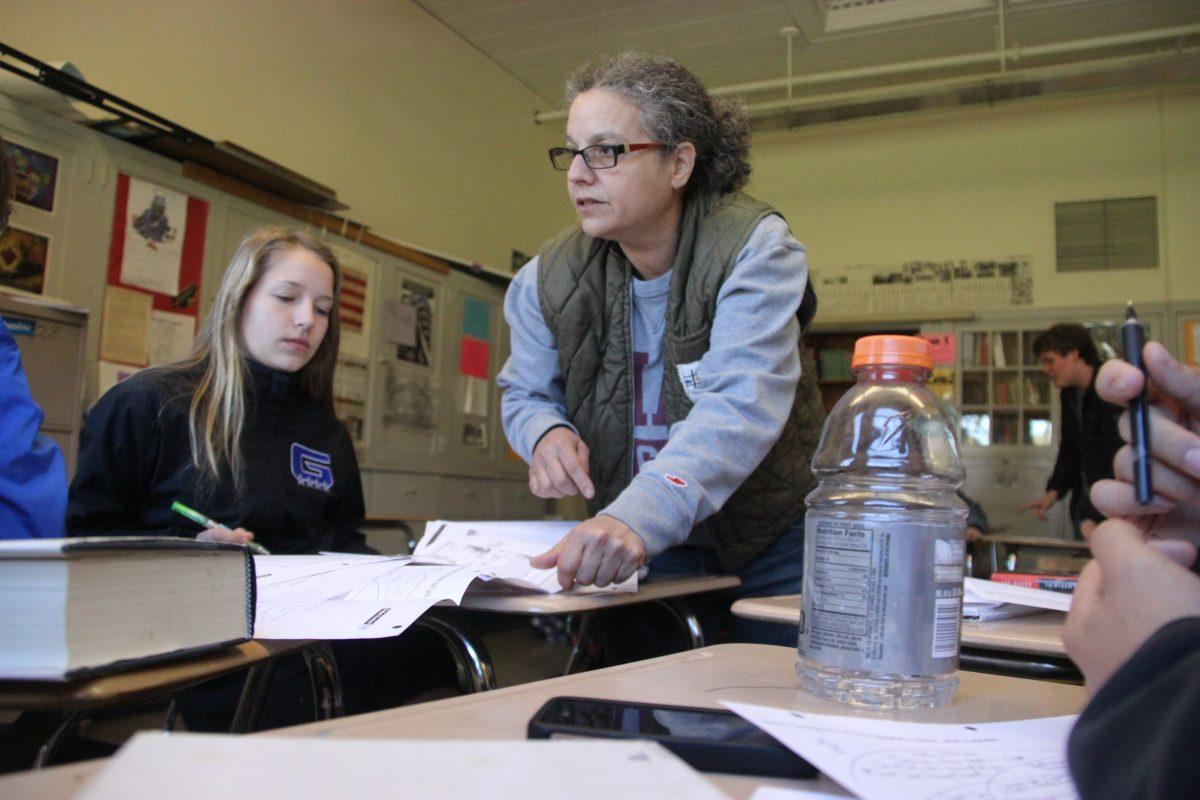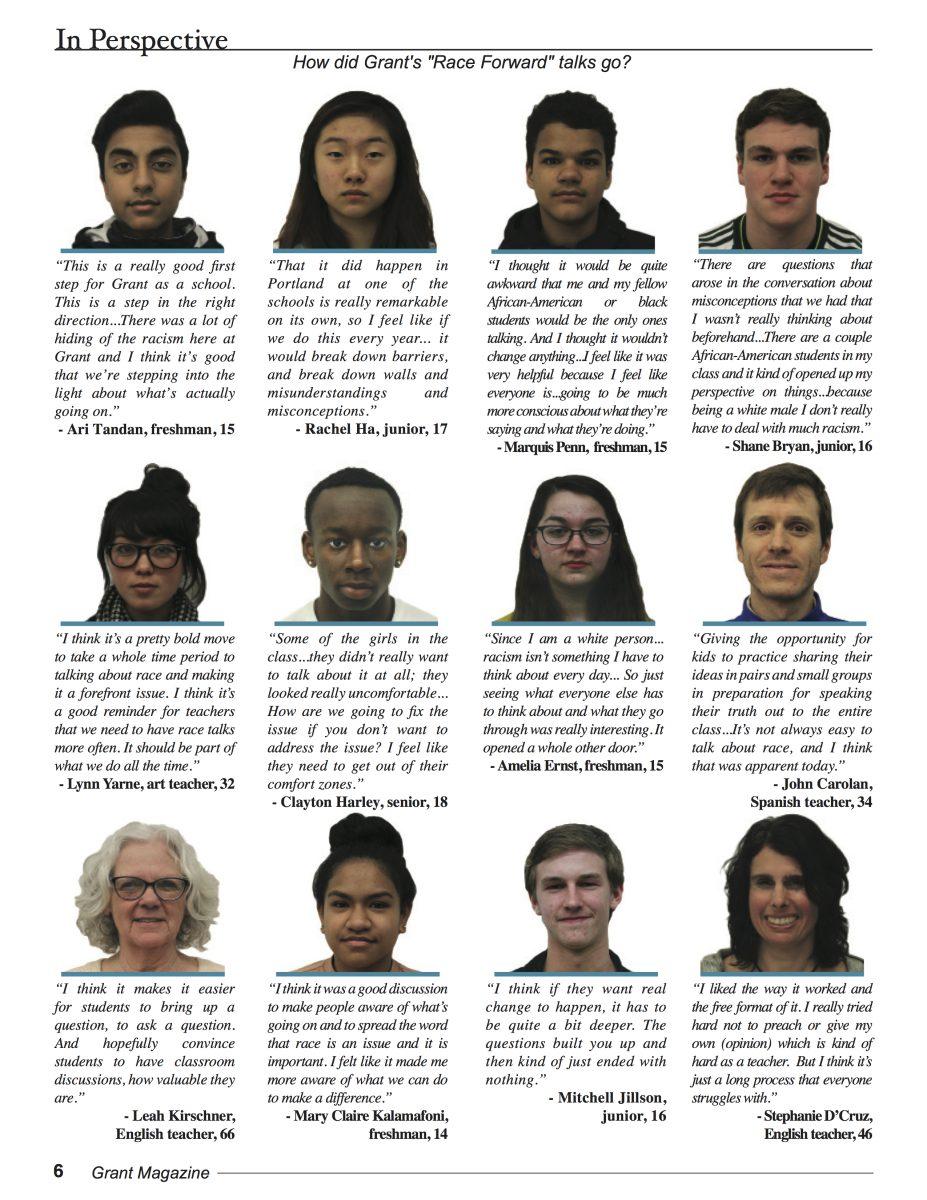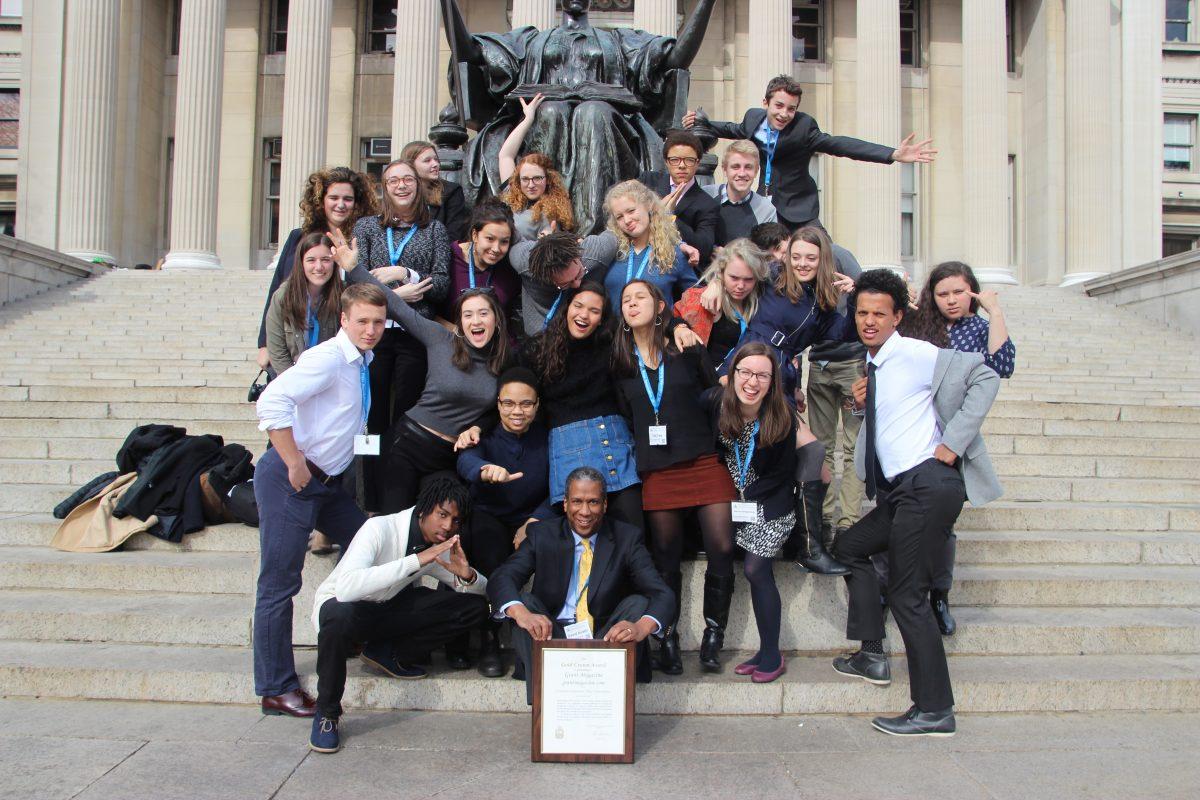The bell rings for lunch and Grant High School teacher Marta Repollet’s classroom comes alive.
It’s the weekly MEChA club meeting, and a group of students begins to flow into the room. MEChA stands for Movimiento Estudiantil Chicano de Aztlán, and the students represent a variety of backgrounds.
Some sit on desks, chatting with each other, and others play music from their phones. They’re going over details for a field trip the next day.
Repollet, who’s dressed in loose jeans and a T-shirt, her hair pulled back into a low ponytail, is all business as she hands out matching T-shirts and goes over the schedule.
As the meeting continues, other students trickle in, many carrying lunch trays from the cafeteria. Three girls from an English Language Development (ELD) class make their way to the back of the classroom with their lunches.
When the meeting ends, Repollet pulls up a chair next to one of the girls in the back, Yaislenis Estrada, who shows her a funny video on her phone. Repollet laughs, then goes back to her desk to get in some work before lunch is over.
The students say they feel comfortable with her.
“She always says that her room is open to everyone,” Estrada says. “So we always go there. When you go to her room, you can talk to her about anything, and she will be open about it.”
Repollet’s classroom has become a hub for students. She has made it her duty to create a welcoming environment for Latino students and other students of color at Grant, and the daily makeup of her classroom at lunch is a clear indicator that she’s met her goal.
When talking about her ELD students, she says, “they seem very invisibilized in this school, being such a small population and then coming from other languages and other cultures that aren’t often acknowledged. So it’s really important for me to create a space for them where they feel safe. That has extended to all students.”
In a sense, Repollet has always been a trailblazer. As a first-generation college student, she paved a successful path largely on her own. Now in her ninth year at Grant, she’s taking concrete strides to make the school more equitable.
For years, Grant has been making slow progress to close the achievement gap and desegregate the school. Repollet is at the center of this as one of the leading forces behind “Living in the U.S.A.,” a popular history course at Grant that highlights the narratives of people of color in the historical context of this country.
“We have a tendency to go the path of least resistance, teach the same you’ve always done, teach the stuff that doesn’t get pushback from parents and students,” says Pardis Navi, a retired Grant teacher and friend of Repollet.
“What I respect about Ms. Repollet is that she didn’t take that path,” Navi says. “She took a path that she knew was good for students. She took a path that she believed that in the end, she was gonna educate students.”
It’s clear no one needs to tell Repollet what to do.
She was born in Brooklyn, N.Y. Her parents, Hilda and Oscar Repollet, were from Cuba and Puerto Rico, respectively and moved to the city as adults. Marta Repollet also has a sister, Minerva, who is seven years older.
Repollet didn’t begin speaking English until she was enrolled in preschool, and at home, Spanish remained the dominant language.
Hilda Repollet was a seamstress and Oscar Repollet was a janitor. Money was tight, and her parents had to work long hours to keep the family afloat, often not coming home until 6 p.m. From elementary school on, Marta Repollet carried her own key and let herself into their apartment after school.
“I felt like I had a responsibility of being pretty independent,” she says.
Hilda Repollet only had an eighth-grade level education. But she still stressed the importance of pursuing a higher education.
“I could just hear her say over and over, ‘I want you to do something better,’” says Repollet.
So it was natural for academics to become a focus in Repollet’s life. She remembers when at age nine a salesman rang their bell, offering a set of Britannica encyclopedias. She asked her mother for a set and Hilda Repollet put money aside to buy one.
“That, to me, was like a window to the world,” says Repollet, who would flip through the books regularly for research on a school subject or just to learn about a new topic.
There wasn’t much room for a desk in the cramped space, so Repollet would usually clear off her mother’s sewing table and use it to study and do homework.
After attending Catholic schools for elementary and middle school, Repollet was accepted into the prestigious Edward R. Murrow High School, known for its focus on communication.
It also has a stellar science program, which was what attracted Repollet the most.
During her first year, she met with a counselor about forecasting for future classes. “I got a negative vibe from (him),” she recalls.
He placed her in the lowest-level classes and didn’t listen when she told him she wanted to be in the most challenging science classes possible. Repollet remembers walking away from the meeting feeling stereotyped, and she never met with him again.
“It only took one experience before I knew that I was gonna have to do this myself,” she says.
Instead, she got help from her teachers to take the classes she wanted, and she ended up doubling on science classes for the next three years.
Her father was an alcoholic and was only partially present throughout Repollet’s childhood and teen years, often coming home late after a night of drinking. Hilda Repollet divorced him during Marta Repollet’s junior year of high school, and Oscar Repollet moved back to Puerto Rico.
Marta Repollet stayed in touch with him until he passed away in 2005. “I don’t remember ever being angry with him,” she says. “I remember feeling sorry for him. He was a good man. He just had this disease.”
Meanwhile, when she was in school, she had to handle her own business. She registered herself for the SATs and signed up for college visits on her own. She would often wake up early in the morning to finish homework or study for a test.
By her senior year, Repollet’s hard work had paid off. She was accepted to the University of California at Santa Cruz.
“It only took one experience beforeI knew that I was gonna have to do this myself.”- Marta Repollet
She stuck with science and signed up for a rigorous course load that included calculus and chemistry. But after taking some English classes in addition to her other courses, she realized she wanted something else.
“College has that power of opening up worlds,” she says now. “You sort of have this freedom to find yourself, and that’s essentially what happened to me.”
She switched to an economics and humanities focus, spending her free time studying at a professor’s house with a group of students who became her close friends. She also became involved in the South African divestment movement on campus, an immigrant rights organization and student government.
As part of a campus job, she worked with early outreach students at inner-city high schools. She tutored and ran workshops with the end goal of getting the students on a college path.
After Santa Cruz, Repollet moved back to the East Coast and went to graduate school at University of Massachusetts. There, Repollet buckled down to get her master’s in education and spent her time studying at the quieter library on the nearby Smith College campus.
She taught at a residential program for at-risk youth – kids who were coming out of foster care or came from drug-affected parents. In addition to teaching there, she was charged with monitoring students for cutting and she had to learn how to put them in restraints if someone acted out. It was tough, but, says Repollet: “It at least gave me my first taste of a classroom.”
Upon graduating, she moved back to California in search of a teaching job. In a time of budget cuts and layoffs, it wasn’t easy.
“I had to do a couple other types of things,” recalls Repollet. She worked in tutoring centers and later became a long-term substitute at a high school in San Francisco.
In 1994, Repollet decided to pack up and move to Portland for a more stable career.
In Portland, she met Cheryl Crowell, who was her dentist’s assistant. Repollet asked Crowell about the best trails in Portland, and they became friends.
They later traveled to Puerto Rico to meet up with Repollet’s extended family. Crowell, whose family passed away when she was young, also became close with Repollet’s mother and spent a few weeks with her in New York.
In 2005, Crowell started the process of adopting her grown daughter’s children. Her daughter was struggling with health problems and couldn’t take care of her kids.
Taking on four young children was a huge responsibility, so Repollet helped out. “I felt like Cheryl needed more support and help, and that’s where I became more involved in supporting her around the grandchildren,” says Repollet.
She visited whenever she could, taking them out for the day to give Crowell a break. Trips to OMSI and Oaks Park became part of their repertoire, and Repollet also began helping them with their schoolwork.
Now the boys, ages 13, 10, 6 and 5, call her “mommy” and she considers herself to be their co-parent.
“She helps me with everything,” says Crowell. “She’s an amazing mother.”
Repollet taught at Portland Community College and Metropolitan Learning Center, where she was able to design her own courses as part of the school’s alternative curriculum, before landing at Jefferson High School in 2002. There, she got another opportunity to immerse herself in course development; she worked with teachers to develop a class devoted to the history of Portland and the Jefferson community.

Creating courses, says Repollet, “keeps whatever I’m teaching fresh and engaging for me.”
She switched to Grant in 2007, which she found to be a stark difference to the small and community-oriented Jefferson.
“Teachers seemed extremely busy – so busy that it was hard to get them to greet you in the hallways sometimes,” recalls Repollet. “I felt very alone that first year.”
Things began to look up when a Latina student approached her and asked if she wanted to be the faculty advisor for the Latino club she was organizing. Repollet immediately said yes. That year, they organized a “teach in” presentation on Cinco-de-Mayo and a Latin American-inspired meal for the club during the holidays.
But Repollet was still struck with the racial divisions at Grant, especially noticing how it seemed as if there were two different schools in one building.
“There was one (school) for the really intrinsically motivated kids who had a lot of support from their homes since they were children,” says Repollet. “And then there was this other school that…didn’t challenge students…and those students tended to be students of color or low socioeconomic students.”
How this could change remained a tough question. An idea for a humanities and diversity focused class had been bouncing around Repollet’s mind for a while, and finally she decided to act on it.
When she first presented the idea to administration at the time, she was told no. But the response was quite different during Vivian Orlen’s time as principal, and she was given the permission to give it a try.
She and then-English teacher Russ Peterson began brainstorming and decided to team up on the class. They sifted through previous units they had taught to develop a course that covered all cultures and races.
“Living in the U.S. is thematic,” she explains. “It uses multiple texts, multiple sources, including literature, multiple narratives in U.S. history.”
Sagen Maharjan took the class as a sophomore and remembers it well. “It did not just cover about the U.S. It covered about like Latino Americans and other countries, too,” says Maharjan, who moved to Portland from Nepal four years ago.
Initially, the classes were small. But in recent years, the popularity of the class has grown. And next year, Living in the U.S.A. will be the only U.S. history class available. Repollet and Peterson will work to train members of the history department over the summer.
At recent equity meetings, the class has been cited by members of the Black Student Union and other students as the only other class besides African-American Literature that discusses black history, apart from slavery.
Living in the U.S.A. will once again become a focus for Repollet next year. But because of the decision to eliminate a required U.S. history course for the sophomores this year, her focus has been on her Modern World History and ELD classes.
Estrada has been in her class and enjoys the unique atmosphere. Recently, Repollet took some students out to celebrate Estrada receiving an Act Six scholarship to college.
“She was the teacher who supported me in everything,” says Estrada, who moved to Portland from Cuba five years ago. “She knows Spanish, so she used to talk with me in Spanish.”
Adds Estrada: “She knows the problem that there is in Grant with Latinos. There’s not that many Latinos here, so we don’t speak that much. I feel like she wants us to …speak out.”
Repollet has also remained the faculty advisor of what is now the MEChA club. She decided to convert the Latino club to be a formal chapter of the nationwide MEChA organization this year and continues to recruit new members, which hasn’t always proved to be easy.
“A major struggle we’ve had in the Latino club is getting Latino kids to embrace their Latino heritage,” she says. “I think sometimes they squash it in this club because it’s not acknowledged and it’s not celebrated.”
Outside of Grant, much of Repollet’s time is spent at Bridge Meadows, an apartment complex in North Portland where elders live among families with foster kids. Its purpose is to offer support for foster children, and it’s where Crowell and her grandchildren have lived since 2011.
Repollet stops by at least once a week to help co-parent the children and spend time with Crowell. “It’s nice to have these children in my life,” says Repollet.
She’s also been spending more time with her mother, who moved to Portland five years ago with Minerva Repollet to be closer to family. Last spring, her mother began developing dementia and she now lives in a rehabilitation home where she receives specialized care.
“It’s tough to see somebody who…had such a big personality, be reduced to something so simple, where even having a conversation is difficult,” says Repollet. “At the same time, I feel very blessed to have her live as long as she has, so I have to be grateful.”
Repollet’s role at Grant – as a self-described teacher activist – remains firm. “If we want to live up to the founding ideals of this country and this democracy it’s about,” she says. “How do you create critical thinkers and allow people to empower themselves?”◊













































